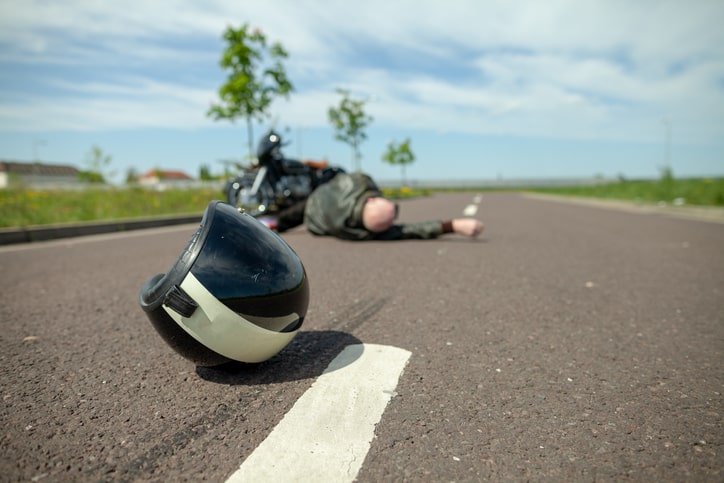Get Our Insider to Property Damage Brochure

Tips for Dealing with PTSD from a North Carolina Motorcycle Accident
October 14, 2024Motorcycle accidents can be devastating, not only because of the physical injuries that can occur but also due to the psychological trauma that often follows. Post-Traumatic Stress Disorder (PTSD) is a common but frequently overlooked consequence of motorcycle accidents, and it can deeply affect your mental and emotional well-being long after the physical wounds have healed.
If you’ve been involved in a motorcycle accident in North Carolina and are experiencing symptoms of PTSD, you are not alone. Many accident victims face challenges with anxiety, flashbacks, and fear. Here, our Charlotte personal injury lawyers at Dewey, Ramsay & Hunt, P.A., list some essential tips for recognizing and coping with PTSD after a motorcycle accident, along with guidance on how to seek the help you need to recover.
Understanding PTSD After a Motorcycle Accident in North Carolina
Post-Traumatic Stress Disorder (PTSD) is a mental health condition triggered by a terrifying or life-threatening event, such as a serious motorcycle accident. Even if you physically survived the accident, your brain may continue to replay the event, leading to intense emotional distress.
Common symptoms of PTSD include:
- Intrusive memories: Flashbacks, nightmares, or recurring thoughts about the accident.
- Avoidance: Avoiding places, people, or activities that remind you of the accident, including riding a motorcycle.
- Hyperarousal: Feeling constantly on edge, having trouble sleeping, or being easily startled.
- Mood changes: Experiencing negative thoughts, guilt or shame, or losing interest in activities you once enjoyed.
One of the first and most important steps in dealing with PTSD is acknowledging that you are struggling emotionally after the accident. It’s common to downplay psychological symptoms, but recognizing your feelings is essential to healing. If you’re experiencing fear, anxiety, or avoidance behaviors, it’s important to take these emotions seriously and understand that they are a valid response to a traumatic event.
Seek Help From a PTSD Specialist
If you believe you may have PTSD, seeking professional help is critical. A licensed mental health professional, such as a therapist or counselor, can help you work through the emotional and psychological aftermath of the accident.
Types of therapy that can be effective in treating PTSD include:
- Cognitive-behavioral therapy (CBT): This type of therapy helps you recognize and change negative thought patterns and behaviors associated with the trauma.
- Exposure therapy: This technique involves gradually confronting the memories and triggers of the accident in a safe and controlled environment.
- Eye Movement Desensitization and Reprocessing (EMDR): EMDR is designed to help individuals process traumatic memories in a way that reduces the distress they cause.
A mental health professional will help you develop coping strategies and provide a safe space to discuss your fears, which can be crucial to your recovery.
Build a Support System
Dealing with PTSD can feel isolating, but you don’t have to go through it alone. Surround yourself with a supportive network of family, friends, and loved ones who can offer emotional support. It can also be beneficial to connect with others who have experienced similar trauma, such as through a support group for accident survivors.
A support system helps reduce feelings of isolation, provides a space for open communication, and allows you to lean on others when you’re struggling. In North Carolina, many resources are available for accident victims, including local support groups and online communities.
Practice Mindfulness and Relaxation Techniques
PTSD can lead to a constant state of hyperarousal, making it difficult to relax or feel at peace. Mindfulness and relaxation techniques can be incredibly beneficial in helping you manage anxiety and regain a sense of control over your emotions.
Some helpful strategies include:
- Deep breathing exercises: Taking slow, deep breaths can help calm your nervous system during anxiety.
- Meditation: Mindfulness meditation allows you to focus on the present moment, reducing stress and calming your mind.
- Progressive muscle relaxation: This technique involves tensing and relaxing different muscle groups to release physical tension associated with PTSD.
Practicing these techniques regularly can help you reduce stress and anxiety, especially in triggering situations.
Consider Legal Action for Compensation
Motorcycle accidents often result in significant medical bills, lost wages, and emotional trauma. If someone else’s negligence caused your accident, it’s essential to consult with a North Carolina personal injury attorney to explore your options for recovering compensation. Emotional distress, including PTSD, is a recognized form of damage in personal injury claims, and you may be entitled to financial compensation for therapy, counseling, and other treatment costs.
Our skilled North Carolina personal injury attorneys can help you document your psychological trauma and work with mental health experts to present a compelling case for compensation. This financial support can help you access the treatment and care you need to recover from your injuries—both physical and emotional.
Contact Our Trusted Motorcycle Accident Attorneys in Charlotte
If you were injured in a motorcycle accident caused by another driver’s negligence in North Carolina, our personal injury attorneys in Charlotte at Dewey, Ramsay & Hunt, P.A., want to hear your story during a free consultation by calling 704-377-3737 or contacting us online.
We provide unique legal services tailored to each client’s needs and do not get paid unless you do.
Your Injury, Our Fight. How can we help you take a stand?
Because every case is different, the description of awards and issues previously managed by our law firm does not guarantee a similar outcome in current or future cases.
Related Links:
- Why Distracted Drivers Heavily Impact the Safety of North Carolina Motorcyclists
- North Carolina Motorcycle Accidents, Injuries and Fatalities Remain Prevalent
- Should I Attend a North Carolina Motorcycle Safety Course?
- Motorcycle Accident Prevention: The Role of Other Road Users

